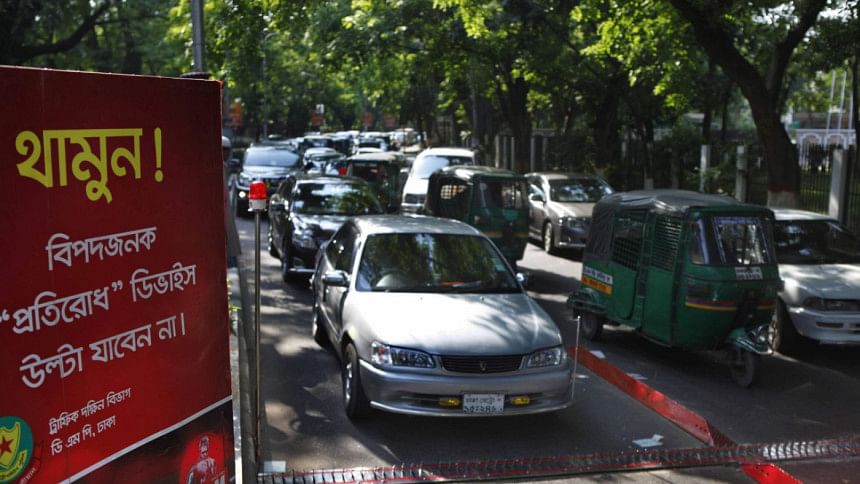These rules are made for breaking

OUR (yours, mine, his and hers) general attitude towards any law is that firstly, it is meant for someone else (perhaps), and secondly, it does not really harm anyone if I or my next of kin or my driver breaks a bit of the diktat here and over there. By that philosophy if you will, we have successfully turned this country into a lawbreakers' paradise, and you are wondering why our population is still rising.
Plato had passed his verdict on this nation two and a half centuries ago (that's what makes him one of the greatest thinkers) when he said: "Good people do not need laws to tell them to act responsibly"; we have not. And then he dealt a double blow without even ever meeting a single Bangalee by predicting that "bad people will find a way around the laws." We have.
Governance, ever since the Greek maestros invented it, had to thrive on having a bunch of criminals; or else what would it govern? According to Ayan Rand, author of The Fountainhead, a government may go as far as making criminals if there aren't enough of them. 'This definitely was not our problem. So the powers in the West that want to remain in power declare so many things to be a crime that it becomes impossible for men to live without breaking laws.' She was a woman.
As is the case with us, we like to imitate the good things of the foreners (and the bad), as if the legacy of excess baggage that the British left behind (as laws) was not enough. And although we were never short of people who break and boast, the laws they kept coming.
In justifying the above diatribe, let us delve into a few of the recent legislations in an area where we have been traditionally spending most of our time. No points for guessing the road, although our hopes of relief are rising with the pillars of the numerous under-construction flyovers, now near completion.
Occasionally, an observant you may come across a patchy signpost (derived from some law of some department), hanging discretely on a lamppost and warning vehicle drivers (who have 6/6 eyesight and can read while moving fast), not to cross the sound level above, say seventy or eighty decibels. What is a decibel? Such not-so idyllic terms are for the professor in a Physics lab and some selected poets to fiddle with. It rhymes with dumbbell, but it does not ring a bell on drivers who have to honk and honk to see if their tyres are doing okay, or to greet fellow drivers every three metres.
A court order, if my memory is not failing, declared clearly not too distant a time ago that motorcycles should not ply on pavements. In my opinion, based on my experience as one who never learnt to ride a motor bike, the worst violators on the road, the motor cyclists will ride anywhere and on anything. Most often they will also honk to move the pedestrians off from the latter's only oasis.
Soon after came another court directive, instructing drivers not to drive on the wrong side of the road. Strange order, but given our heritage of boating on our generous waterways, this was a habit that had to be curbed. I bet you my pride, you stand on any VIP Road, whatever that has come to mean, you will find vehicles violating this order. The bigger the vehicle, the more authority with which it plies the American way, and several little vehicles follow, as they are expected to by 'big brother.'
Only a few months ago, the police or some authority declared a Tk. 200 fine for jaywalking on the road from Farmgate to Shahbagh. The matter was so exciting that a few brave souls tried to figure out whether it was possible to cross without being caught, and their pockets became that much lighter. What happened to the ones who do not carry that kind of cash is not known? Press photographers and TV cameramen also had a heyday, but for two days, after which the matter was lost in the heap of tribulations that demonstrate our daily life.
As for the motorcyclists, the mandatory helmet rule was lost with the first passenger sitting on the back, or the first helmet. But, most recently, they were told that double- or triple-riding would not be allowed, apparently to check terrorist activities. This sent shivers through the spine of the flingers of petrol bombs, but was also unkind on families for whom this was the only affordable means of transportation. The rule was defeated by a show of passengers with even policemen caught on camera riding triple.
We are not groomed to abide by laws, except with a stick on wherever you please. For countries that look chhim-chhaam, listening to the law is a way of life. As the French lawyer, Charles de Montesquieu said almost three hundred years ago: "There is no nation so powerful, as the one that obeys its laws not from principles of fear or reason, but from passion." Sadly, we are that many years behind.
The wrtier is a practising Architect at BashaBari Ltd. E-mail: [email protected]

 For all latest news, follow The Daily Star's Google News channel.
For all latest news, follow The Daily Star's Google News channel. 



Comments